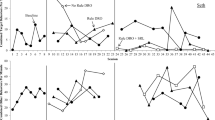Abstract
Reinforcement-induced stereotypy and social conditions involved in rule-following were investigated in two experiments. In both experiments the first phase was designed to investigate reinforcement-induced stereotypy. Subjects were presented with a computer task in which reinforcement was earned for any response pattern which moved a lighted square from the top left to the bottom right of a 5 × 5 matrix. In the second phase, a rule was introduced requiring subjects to perform a different pattern each trial in order to earn reinforcement. In Experiment 1, the third phase was a return to Phase 1 contingencies; in Experiment 2, the third phase was an extinction phase. Social conditions were manipulated by having the experimenter remain in the room during the task (experimenter present), or by having the subject complete the task alone. Data were analyzed by examining the percentage of novel response patterns occurring in each phase of the task. Sixty-five percent of subjects in Experiment 1 and 80% in Experiment 2 developed stereotyped response patterns in Phase 1. However, stereotypy was found to be more complex than just the development of one predominant response pattern. Manipulating social conditions was found to affect responding, with the experimenter-present subjects showing higher degrees of response variability. In Experiment 2 extinction was found’to increase response variability, while social conditions acted to maintain higher rates of responding for the experimenter-present subjects.
Similar content being viewed by others
References
HAYES, S. C., BROWNSTEIN, A. J., ZETTLE, R. D., ROSENFARB, I., & KORN Z. (1986). Rule-governed behavior and sensitivity to rapidly changing consequences of responding. Journal of the Experimental Analysis of Behavior, 45, 237–256.
HAYES, S. C., & WOLF, M. (1984). Cues, consequences, and therapeutic talk: Effects of social context and coping statements on pain. Behavior Research and Therapy, 22, 385–392.
HERRNSTEIN, R. J. (1961). Stereotypy and intermittent reinforcement. Science, 133, 2067–2069.
NOTTERMAN, J. M. (1959). Force emission during bar pressing. Journal of Experimental Psychology, 58, 341–347.
NOTTERMAN, J. M., & MINTZ, P. E. (1965). Dynamics of response. New York: Wiley.
PAGE, S., & NEURINGER, A. (1985). Variability is an operant. Journal of Experimental Psychology: Animal Behavior Processes, 11, 429–452.
SCHWARTZ, B. (1980). Development of complex, stereotyped behavior in pigeons. Journal of Experimental Analysis of Behavior, 33, 153–166.
SCHWARTZ, B. (1981). Control of complex sequential operants by systematic visual information in pigeons. Journal of Experimental Psychology: Animal Behavior Processes, 7, 31–44.
SCHWARTZ, B. (1982a). Failure to produce response variability with reinforcement. Journal of the Experimental Analysis of Behavior, 37, 171–181.
SCHWARTZ, B. (1982b). Reinforcement-induced behavior stereotypy: How not to teach people to discover rules. Journal of Experimental Psychology: General, 111, 23–59.
VOGEL, R., & ANNAU, Z. (1973). An operant discrimination task allowing variability of reinforced response patterning. Journal of the Experimental Analysis of Behavior, 20, 1–6.
ZETTLE, R. D., & HAYES, S. C. (1983). The effect of social context on the impact of coping self-statements. Psychological Reports, 52, 391–401.
Author information
Authors and Affiliations
Rights and permissions
About this article
Cite this article
Barrett, D.H., Deitz, S.M., Gaydos, G.R. et al. The Effects of Programmed Contingencies and Social Conditions on Response Stereotypy With Human Subjects. Psychol Rec 37, 489–505 (1987). https://doi.org/10.1007/BF03394995
Published:
Issue Date:
DOI: https://doi.org/10.1007/BF03394995




